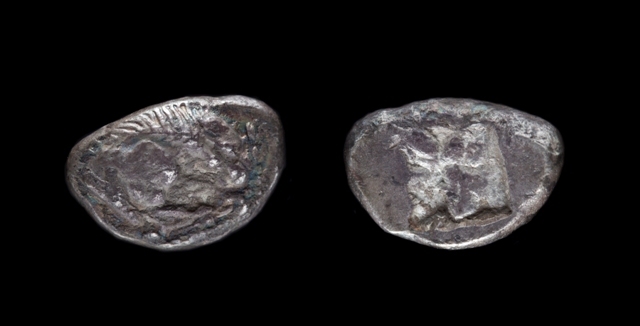Velia, Silver Drachm
Dublin Core
Title
Velia, Silver Drachm
Subject
Velia, Lucania (Italy), Silver Drachm, 535-510 BCE. OBVERSE: Forepart of a lion right with frontal head seen from above, tearing at a stag’s leg.
REVERSE: Incuse broken square without dividing lines.
REVERSE: Incuse broken square without dividing lines.
Description
Herodotus accounts the adventures of the Phocaians, a people from the area of Turkey who were displaced by the spread of the Persian kingdom. These people (Hist. 1. 167) settled in an area they named Hyele, on the coast of the Tyrrhenian Sea, around 538 BCE. It went through several changes of name: Hyele to Ele, to Elea and eventually settling on its Roman name Velia.
The lion and incuse square resemble other coins found in the Aegean world, where the Phocaians had come from. The odd shape, rough design and incuse mark are all examples of early Greek coins.
The lion and incuse square resemble other coins found in the Aegean world, where the Phocaians had come from. The odd shape, rough design and incuse mark are all examples of early Greek coins.
Source
Gift of James and Aneta McIntyre, Hallie Ford Museum of Art, Salem, OR. 2006.010.024
Date
535-510 BCE
Rights
Hallie Ford Museum of Art
Format
1.600 cm
3.800 gr
3.800 gr
Type
Coin
Coverage
This item can be viewed on Hallie Ford Museum of Art's website.
Citation
“Velia, Silver Drachm,” Hallie Ford Museum of Art Exhibits, accessed February 25, 2026, https://library.willamette.edu/hfma/omeka/items/show/76.
